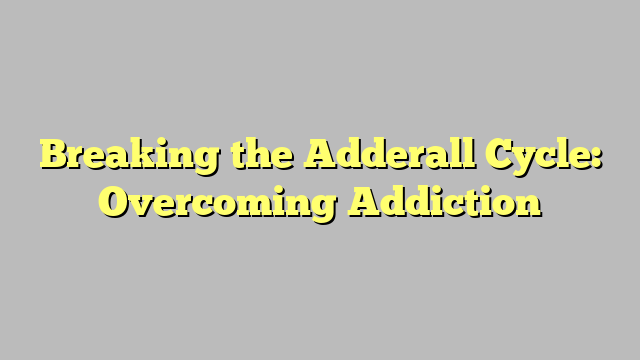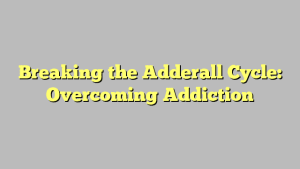Adderall, a popular prescription medication primarily used to treat attention deficit hyperactivity disorder (ADHD) and narcolepsy, has been increasingly misused and abused, leading to a rising concern about Adderall addiction. The drug, a central nervous system stimulant, is known for its ability to enhance focus and concentration while also providing a surge of energy. Unfortunately, these desirable effects can often lead individuals into a cycle of dependence and addiction.
When used without a prescription or in higher doses than recommended, Adderall can produce a euphoric high that can be psychologically addictive. Many individuals, including students seeking academic performance enhancement and professionals looking to boost productivity, may turn to Adderall as a quick-fix solution without fully understanding the potential risks and consequences of its misuse. This misuse can quickly escalate into a full-fledged addiction, impacting various aspects of one’s life including physical health, relationships, and overall well-being.
Recognizing the Signs
It is crucial to be aware of the signs of Adderall addiction. One common indication is an increased tolerance to the medication, leading individuals to take higher doses to achieve the same effects. Another sign is the presence of withdrawal symptoms when the drug is not taken, such as fatigue, depression, or irritability. Additionally, individuals may exhibit secretive behavior regarding their Adderall use, hiding pills or lying about their consumption.
Seeking Help and Support
Recognizing that overcoming Adderall addiction is a challenging journey is the first step toward seeking help and support. It is crucial to reach out to a professional who understands the complexities of addiction and can provide guidance on the best course of action.
You are not alone in this struggle, and seeking support from friends and family members can also play a significant role in your recovery journey. Opening up to loved ones about your addiction can create a strong support system that offers encouragement and accountability along the way.
Joining a support group specifically tailored to individuals struggling with Adderall addiction can provide a sense of community and understanding. Connecting with others who are going through similar experiences can offer valuable insights, encouragement, and a sense of belonging that is crucial in overcoming addiction.
Adderall Addiction
Building a Healthy Lifestyle
To break free from the Adderall cycle, strive to establish a routine that prioritizes physical activity. Regular exercise not only helps in the recovery process but also aids in improving overall well-being. Consider incorporating activities such as jogging, yoga, or cycling into your daily schedule.
In addition to physical exercise, focus on maintaining a balanced diet rich in nutrients. Opt for whole foods such as fruits, vegetables, and lean proteins, while minimizing the intake of processed foods and sugary snacks. A well-rounded diet can provide the necessary energy and nourishment to support your body as it heals from Adderall addiction.
Lastly, prioritize sufficient rest and relaxation as part of your lifestyle changes. Adequate sleep is crucial for both physical and mental health, allowing your body to recuperate and recharge. Engage in stress-relief techniques such as meditation, deep breathing exercises, or hobbies that bring joy and calmness to your daily routine.
















